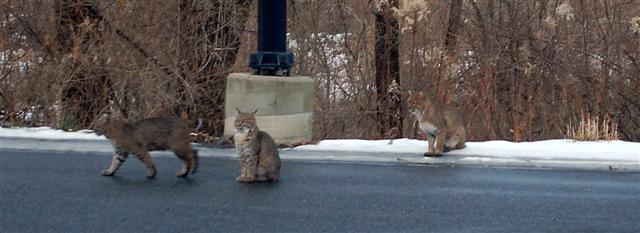A couple weeks ago I had the pleasure of seeing Jonathan Way speak at the Brewster Natural History Museum. During his lecture about coyotes, or coywolves, some of the attendees brought up the return of wild animals to Cape Cod such as bears and fishers. Recalling this story to a friend, I tried in vain to remember some of the other Cape-exotic animals they discussed. Cougars? No, it couldn’t be cougars. I felt pretty silly trying to remember what the animal was; but in my defense – I grew up in the city and the majority of my animal experiences have been in zoos. Luckily there was an article in the Cape Cod Times (referenced in a previous post) soon after, about the evidence of bobcats residing on Cape Cod, and I was able to both remember the correct species, and forward it to my new acquaintance in hopes they would not think I am making up strange stories. I guess when you hear about coyotes being so close by, bobcats in your neighborhood don’t sound that much more unusual.
Cougars, it turns out, can be in places as cold as southern Canada, but they do tend to stay west of the Mississippi. Bobcats can be found all over the United States. Like coyotes and other animals that are starting to thrive in second growth areas, they can live in “urban edge” environments. It is also an opportunistic predator, meaning that it can eat anything from insects to squirrels and fish. Athough not on the endangered list per se, hunting of these animals is banned in many states, which has perhaps contributed to the growth in its population. These animals were exterminated in Massachusetts during the colonial period along with animals like beaver, wolves, cougar and elk. As they returned to newly reforested farmlands, they were considered a nuisance for much of the 20th century; hunting went unregulated until the late 60s. Now hunting is only allowed west of Route 31 on select seasons. Information on the Mass.gov site states there could be about 1300 in Massachusetts. Hunters and trappers have actually hit the Massachusetts quota of 50 bobcats for the first time since that quota was set in 1977.
These elusive and beautiful creatures rarely make their appearance known. One way to find out if there are bobcats in your area is to listen for their eerie screams in early March, when it’s their mating season.

Bobcats in the Berkshires (copyright George Baldasarre 2009)
I found a partial skeleton of a bobcat at Race point 2/18/12.
Hi Dan,
Cool find!
Do you have any pics of the skeleton? If so, I’d be interested in taking a look.
Hey
thanks so much for your comment…I hadn’t thought much about bobcats lately, but I did see my first coyote up close this weekend – actually there were 2 right near route 28. They looked like German shepherds except they kind of galloped like deer. I hope you are blogging too – sounds like you have some insights about nature on Cape Cod.
We saw a Bobcat tonight in Yarmouth. Slowly jogged through an intersection off Long Pond Rd. Pretty cool sight.
Thanks so much for your comment, great to get first hand accounts of the wildlife people are running into on Cape Cod.
Definitely just heard bobcat screams outside our vacation home in Wellfleet. There was no mistaking that sound- we listened to several recordings of the bobcat scream on google and it was dead on!
Thanks for your comment, always so nice to find out people are reading the blog. Bobcats rarely attack humans, but good to keep your distance. Keep small pets safe, and never, ever feed them.